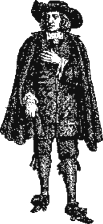Satirical attacks on Puritans
Given that the Puritans were adamantly opposed to the theatres, constantly trying to close* them, it is not surprising that there were some devastating parodies of the Puritan mentality on the stage.
Shakespeare's art tends to the ironical rather than the satirical; but there is at least one caricature in his plays aimed at the Puritans: Malvolio* in Twelfth Night.
More savage are Ben Jonson's parodies of the Puritans as Tribulation Wholesome and Zeal-of-the-Land Busy in The Alchemist and Bartholomew Fair: both are shown to be corrupt, worldly, and self-seeking.
Zeal being zealous
Zeal-of-the-Land Busy interrupts a puppet show, claiming it to be worship of a heathenish idol. Jonson deliciously picks up the rhythms of the evangelist preaching:
Down with Dagon, down with Dagon; 'tis I will no nonger endure your profanations. . . that idol, that heathenish idol, that remains, as I may say, a beam*, a very beam, not a beam of the sun, nor a beam of the mood, nor a beam of a balance, neither a house-beam, nor a weaver's beam, but a beam in the eye, in the eye of the brethren; a very great beam; an exceeding great beam; such as are your stage-players, rhymers, and morris-dancers. . .
(5.5.1-11)
Zeal is defeated in his argument with one of the puppets, as he had earlier discovered excellent (if hypocritical) reasons for enjoying the other sights of the fair he had come to castigate.
Footnotes
-
Fighting for the stage
The players waged a running battle with the Mayor of London and his Council; the theatres were eventually closed by the Puritan Parliament in 1643.
-
Malvolio
The name means "evil-wishing." Malvolio is sanctimoniously opposed to revelry.
-
Practicing what he preaches?
Zeal is referring to the passage from the Sermon on the Mount: "why beholdest thou the mote that is in thy brother's eye, but considerest not the beam that is in thine own eye?" (Matthew 7:3).
